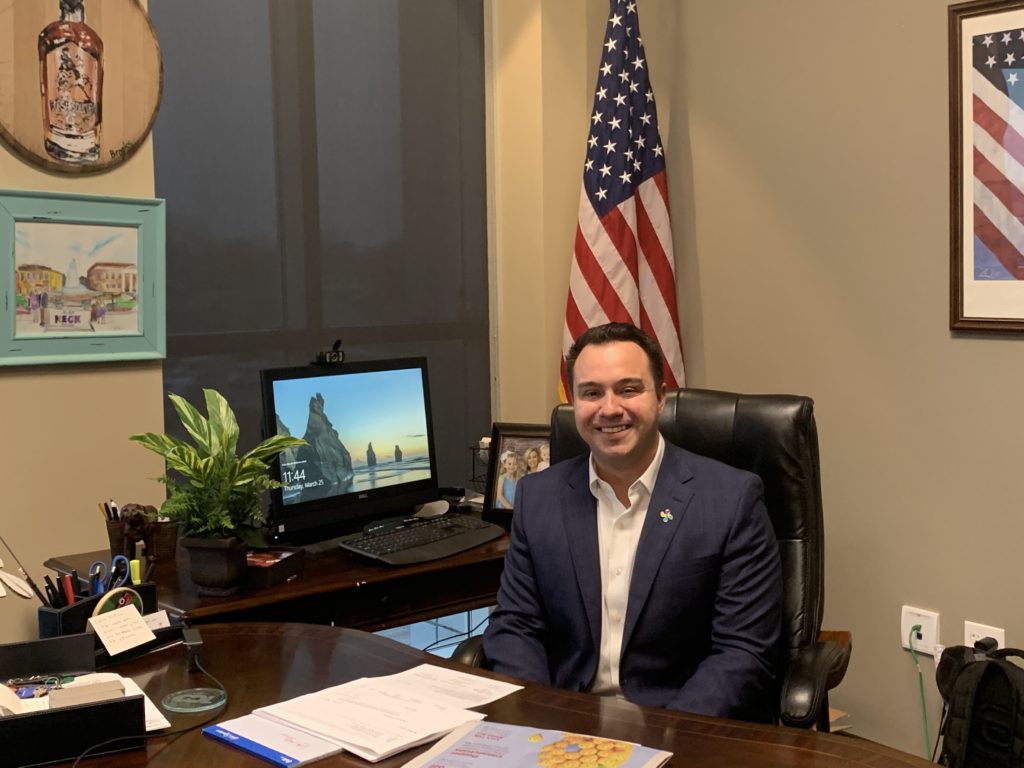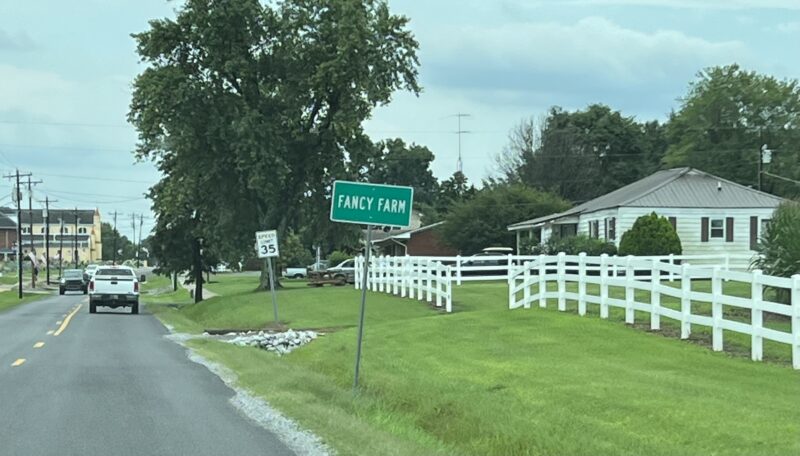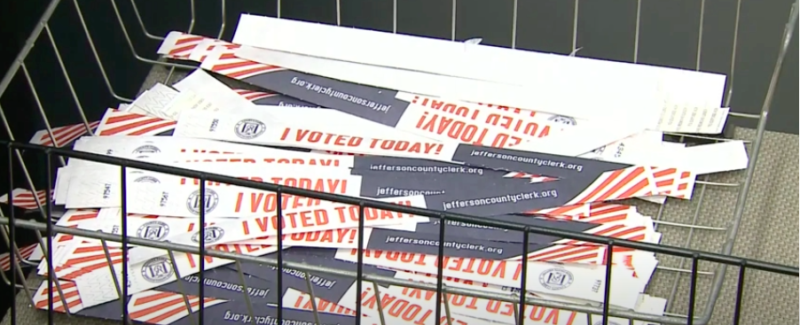SOMERSET – At a conference table in his office on the third floor of a brick and glass building dubbed the Energy Center, Somerset Mayor Alan Keck takes a sip from his sugar-free Monster energy drink, leans forward in his seat and lays out his vision for the state of Kentucky.
Keck, a 36 year-old Republican born in Somerset to parents originally from Illinois, is still in his first term as the mayor of the south central Kentucky city, but he has much larger ambitions. He is considering a run for governor.
Elected in November 2018, Keck unseated former Mayor Eddie Girdler, who served for 12 years in the post. Girdler courted controversy during the election, being accused of leaving the scene of an accident involving a 15-year old on a bicycle. Keck won the race with 55 percent of the vote.
Keck originally ran for mayor, because of a moment in his teenage years where he felt he was called to go into public service.
“When you’re young you think about running for the president or running for Senate or whatever, and you get older and you realize you don’t just wake up and become U.S. Senator, and there’s ways you serve and get involved,” he said.
The 2018 mayoral race was Keck’s second stint into politics, in his first he was defeated by Girdler in the 2014 Somerset mayoral race. Keck says he will run for a second term as mayor in 2022, something he plans on officially announcing later this year. The timing could make for a sticky situation for the mayor of the city of 12,000, as the filing deadline for the gubernatorial race looms in early January of 2023, mere months after a potential re-election to his current post.
Even though he is still in his first term, Keck says he’s proud of what he has been able to accomplish in a short amount of time. As calls around the country came to defund the police, Keck said he wanted to increase pay for Somerset first responders – something he did to the tune of 20 percent pay increases.
Keck was able to boost the salary of the personnel via attrition within Somerset government – that bought him a million dollars via previously allocated salary and benefits. His administration then moved those dollars over to the bucket for first responders. The city is also growing, adding $300,000 in new revenue, he said.
“We launched, in the first year, four free community festivals and as part of that we had people coming downtown and starting to reinvest in what I would call the heartbeat of Kentucky cities or communities – and that’s your historical downtown,” Keck said. “We started ‘Keep Somerset Beautiful’ campaign where we would splash paint on walls, and you look out and see people taking pride in their community and facilities again, and that led to new investment.”
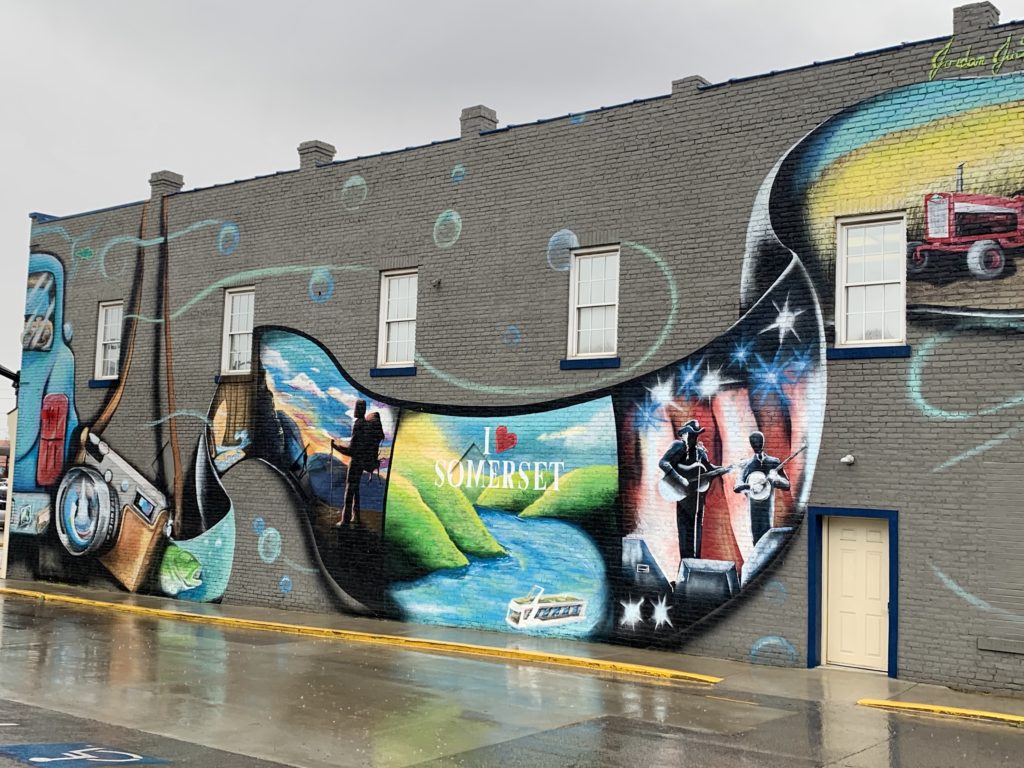
Seventy miles south of Lexington rests Somerset, the county seat of Pulaski County. Somerset takes its name from Somerset County, New Jersey, where the first settlers hailed from. Less than an hour from the Tennessee border, the city competes economically with the volunteer state.
Today, the heart of Somerset remains small, with an overall population just less than 12,000. However, the city provides additional services like water and electric to over 65,000 people in Pulaski County, Keck said. Nearby the massive man-made Lake Cumberland primed the region for tourism. Somerset and the surrounding region maximizes the tourism economy with a city splash park, monthly car shows, and a museum located outside the city at the site of a Civil War battle.
The city was also able to attract new investment via Horse Soldier Bourbon Distillery, which announced a $50 million expansion in December of 2019. Horse Soldier brought 56 new jobs to the region, and satisfied a pledge from Keck during his 2018 race – bring a bourbon distillery to Pulaski County.
Keck said Horse Soldier saw Somerset “at our best” making a trip to the city during one of the street festivals.
Growing the base, reallocating dollars, and running government like a business are all central themes for the mayor.
“Somerset in a lot of ways is a microcosm of what you face at state government,” he said. “We’re still faced with bloated pensions. We’re faced with some debt, and so we’re trying to tackle some of those things that encumber a lot of municipalities. You have to treat it like a business when you can.”
On the pension front, Keck says the city is “still playing catch up to past bad decisions” coming out of Frankfort. He says the state has spent a decade trying to fix symptoms and haven’t dealt with the problem.
To make it easier for cities and counties, he is an advocate for the long term approach to help municipalities come up with the dollars needed to pay down the pension debt.
“The past administration had a 30-year vision. That might need to be a 40, 50-year vision to stretch it out to where you don’t bankrupt cities and counties.”
LOCAL CONTROL?
In June of 2020, Keck earned national eyeballs with an op-ed originally published in the Louisville Courier Journal that was re-worked and picked up by the New York Times. His argument, it was safe to reopen rural cities like Somerset. Keck argued governors should and local leaders to make the decision to put their people back to work when virus mitigation efforts had proved effective.
“My vision all along was there had to be parallel paths – treat the pandemic and the virus with incredible seriousness and be as safe as we could, but do so with the understanding that people have to make a living,” Keck told KFP.
The op-ed never got a response from the Beshear administration, but he felt it did affect the discourse.
If he was in Gov. Beshear’s shoes, he is unsure that he would hand over control to local elected officials, but said he would have engaged in the conversation.
“They’d have a seat at the table, even if there’s not ultimate control at the local level, I would still have input and voices from local leaders,” he said. “Myself and a lot of my colleagues across the state were frustrated that our voices weren’t heard.”
CONVERSATIONS WITH HAL & A PLATFORM
Taking a page from Bevin’s book of campaign proverbs, Keck says the state has all the advantages – place, resources, infrastructure, people, but what it lacks are the policies and leadership to see it grow and prosper.
Keck is already signaling education and the economy are top issue platforms, if he enters a race for Kentucky’s top post.
Signaling a want to take a “hard look” at funding early childhood education, he said “we’re missing our kids too early.”
“If Kentucky is going to tweak education I don’t think we should just nibble around the edges. Teachers need a loud voice,” he said. “I think if we’re going to have education plans teachers need a seat at the table.”
Still, Frankfort budgets are past the bone when it comes to allocating dollars – leaving precious few options to pay for things that are promised.
Kecks solution, is to look for “operational efficiencies” through the state government workforce and grow the base.
“If there are 5 million people living in Kentucky instead of 4.3 million a lot of those issues would solve themselves.”
He’s also advocating for what he calls, real tax reform. That tax reform would include eliminating the income tax and relying on a consumption based economy, which would of course include sales tax increases. While some would call broad taxing regressive to low income Kentuckians, Keck calls the idea “fair.”
Governors can set the agenda, but as many former governors will tell you that’s as far as it goes. Governors have to work with the elected legislators who will enact those big ticket changes. Keck acknowledges “they make the law,” and says he has “great relationships” with local elected lawmakers serving on behalf of Pulaski County. Still he’s a little short on the juice needed for major reforms amongst a diverse caucus.
“I think that for a long time those folks have been pushing for a policy like this, but it’s scary to say that we might eliminate the income tax – and then what,” he said. “You’ve really got to believe in the tenants of liberty and freedom, and an economy that would roar if you reduce some of those barriers.”
Beyond lawmakers, Keck would lean into what he knows and what he’s advocated for – a seat at the table for local elected officials to have a say on big ticket items.
“You’d want to partner not only with [Frankfort lawmakers] but also with other local leaders,” Keck continued. “If I’m going to be the guy who says whoever the governor is, you should talk to folks like me as mayor, then other mayors and county judges need a seat at this table.”
Keck also has a major ally in the south-central Kentucky corridor in Congressman Hal Rogers, R-Somerset, the longest serving Kentucky federal-elected Republican politician, ever.
The dream job of a lifetime has been serving as Mayor of his hometown of Somerset, he says, but with an awe-shucks attitude he says he is considering higher office. Pending where the state of the commonwealth is down the line, Keck says he will look at running for mayor. He says his record in Somerset makes him pause and ask, what if multiple other communities were on the upswing like his.
Calling Rogers, a “great friend,” Keck says he has talked with Congressman Rogers about running for governor.
“The Congressman ran for Lt. Governor back in 1979, so you don’t look to these things without seeking some advice and wisdom from those, so we just had a chat about what it might look like if I took a look at [running for governor],” he said.
Keck says he will not run for Congress at any point in time. He says he is humbled by the idea when asked, but is firm in staying in Kentucky, adding he refuses to be an absentee father to his three young daughters and a husband to his wife of 11 years.
“Even if he was to retire this term, that is not a job I would be seeking at this time,” he added.
As governor, Keck says he could pull off the challenges of being a father and husband and the leader of Kentucky. He’ll just have to win a second-term as mayor of his city, raise a boatload of cash, and turn right around and run all out statewide for five months against some candidates who are already running shadow campaigns right now.
Or, maybe he won’t.



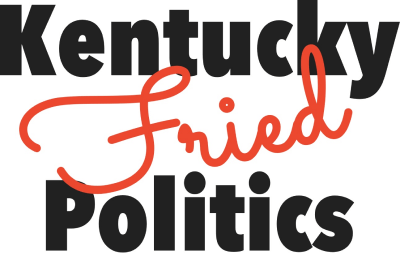
 Login
Login  Must include at least 8 charaters
Must include at least 8 charaters